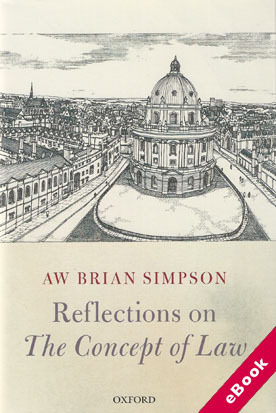
The device(s) you use to access the eBook content must be authorized with an Adobe ID before you download the product otherwise it will fail to register correctly.
For further information see https://www.wildy.com/ebook-formats
Once the order is confirmed an automated e-mail will be sent to you to allow you to download the eBook.
All eBooks are supplied firm sale and cannot be returned. If you believe there is a fault with your eBook then contact us on ebooks@wildy.com and we will help in resolving the issue. This does not affect your statutory rights.
HLA Hart's The Concept of Law is one of the most influential works of philosophy of the twentieth century, redefining the field of legal philosophy and introducing generations of students to philosophical reflection on the nature of law.
Since its publication in 1961 an industry of academic research and debate has grown up around the book, disputing, refining, and developing Hart's work. Under the sheer volume of competing interpretations of the book the original contexts - cultural and intellectual - that shaped Hart's project can be obscured.
In this book, renowned legal historian AWB Simpson attempts to sweep aside the volumes of academic criticism and return to 'Troy I', revealing the world of post-war Oxford that produced Hart and his famous book.
Drawing on his personal experience of studying and teaching in Oxford at the time Hart developed The Concept of Law, Simpson recreates with characteristic wit the social and intellectual culture of Oxford philosophy and the law faculty in the 1950s. He traces Hart's early work and influences, within and outside Oxford, showing how Hart developed his picture of philosophy and its potential for enriching the understanding of law.
He also lays bare the painful shortcomings of post-war Oxford academia, depicting a world of eccentric dons and intellectual Cyclopses - isolated and closed to broad, interdisciplinary exchange - arguing that Hart did not escape from the limitations of his intellectual world.
Simpson's entertaining, and controversial, account of the world that produced The Concept of Law will be essential reading for all those engaged in interpreting and teaching the seminal book, and an engaging read for anyone interested in the history of Oxford philosophy and legal education.
This was Brian Simpson's last book. (August 17, 1931 – January 10, 2011)